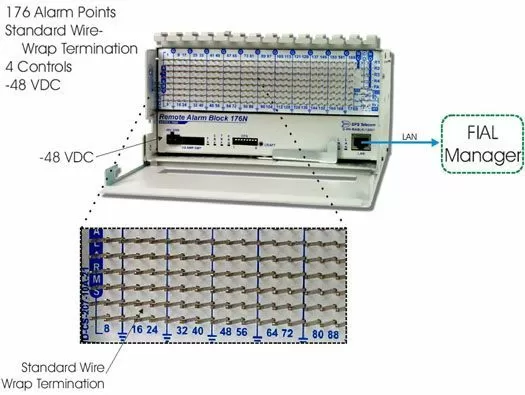Download our free SNMP White Paper. Featuring SNMP Expert Marshall DenHartog.
This guidebook has been created to give you the information you need to successfully implement SNMP-based alarm monitoring in your network.
1-800-693-0351
Have a specific question? Ask our team of expert engineers and get a specific answer!
Sign up for the next DPS Factory Training!

Whether you're new to our equipment or you've used it for years, DPS factory training is the best way to get more from your monitoring.
Reserve Your Seat Today
The application features the Remote Alarm Block to monitor your discrete and analog alarms and report those to your FIAL Master Station.
The Remote Alarm Block (RAB) 176N provides high high-capacity alarm monitoring while retaining rack space for revenue revenue-generating equipment. It is the ideal RTU for any site with many alarms and limited space. It can be mounted on the wall or in a placed in a rack with the supplied rack mounts. The RAB's standard wire wrap terminations for alarms inputs make the unit a natural fit for any telecommunications site where distribution frames are used.
The RAB 176N reports alarms as SNMP traps over UDP/IP, and supports alarm polling via DCP, DCPf, DCPx, or DCP1 over UDP/IP, TCP/IP OR RS232. Both the SNMP and DCP channels can operate at the same time, so the RAB can report alarms simultaneously to multiple Fial or other SNMP managers and the T/Mon NOC Network Alarm Management System. In addition to its 176 discrete alarm inputs, the RAB 176N has 4 control relays, 2 Form A and 23 Form C. Using the control relays, you can reboot remote devices, start backup equipment, and open security doors directly from the T/Mon NOC, saving expensive windshield time. To reduce nuisance alarms, the RAB 176N features user user-set alarm qualification times of 100 to 10,000 milliseconds. This will allow you to clearly distinguish momentary status changes from serious problems. The RAB 176N also supports an internal real real-time clock, so date/time stamps in SNMP traps are always correct. Technicians can view the front LED LED's for local alarm visibility.